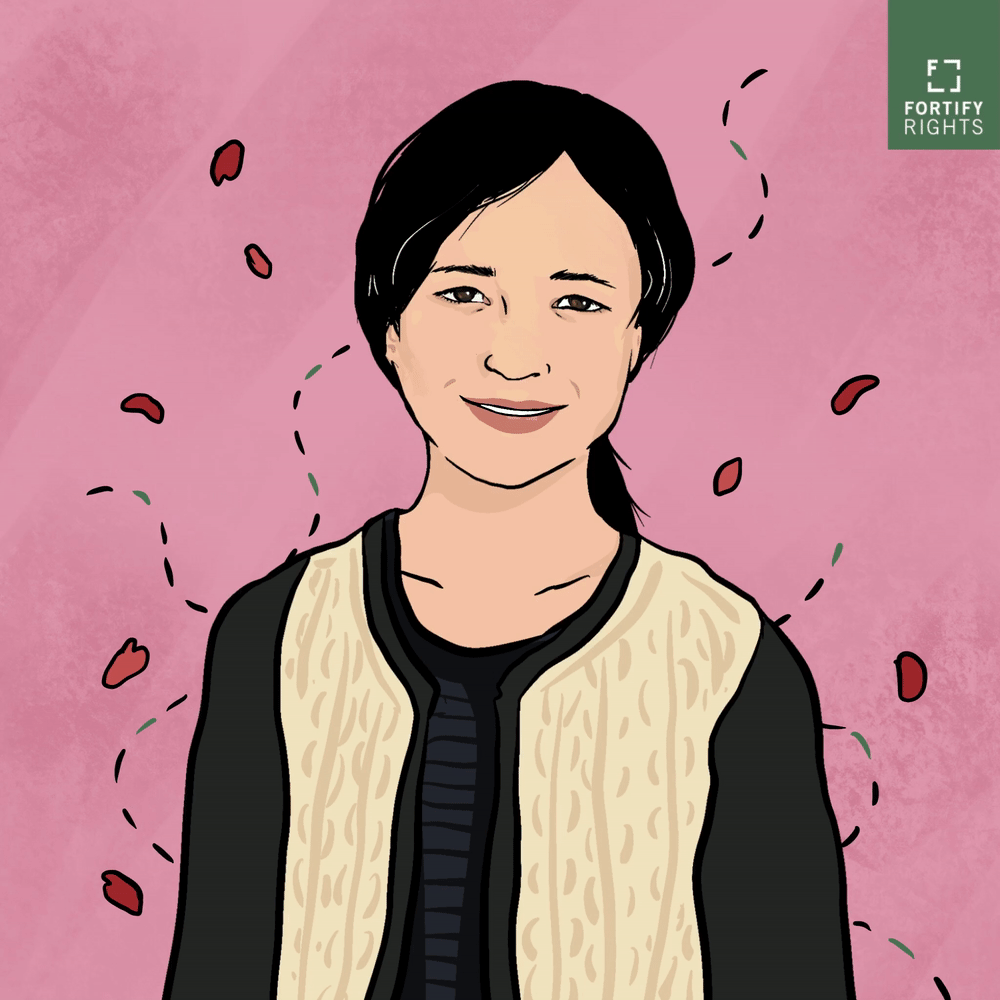“A society that is well educated on gender-based violence is the foundation of a peaceful democratic nation.”
By Mookdapa Yangyuenpradorn for Fortify Rights. Illustration by Tams Lu.
When Mu Zuzan Line – not her real name – was growing up under military rule in Myanmar’s Karenni State in the 1990s, girls faced challenges obtaining an education. Now a prominent women’s rights defender, she is working to strengthen gender equality and end gender-based violence by ensuring women and girls have access to education.
“My parents believed that girls did not belong to the family as they would eventually get married and become members of other families or clans,” Mu Zuzan Line told Fortify Rights. “So, they didn’t bother to educate the girls in our family.”
Mu Zuzan Line also described how she was not alone in facing barriers to obtaining an education. She said: “I saw a lot of women and girls who were just like me, who were denied access to education. I realized there were a lot more women out there who were in worse situations than I was.”
In 2009, at the age of 19, Mu Zuzan Line began volunteering with humanitarian organizations in Myanmar and had the opportunity to travel throughout Karenni State.
“Our region was very underdeveloped, and these villages didn’t receive any support or development programs from the central government,” she told Fortify Rights. “The women didn’t have any knowledge due to lack of schooling, so they were unaware of their situation. They didn’t know they had the agency to improve their own lives.”
This experience shaped Mu Zuzan Line’s future.
“From that point on, it became my goal to help support these women in whatever way possible, and it’s one of the reasons I chose to do what I do today,” she said.
To fulfill this goal, Mu Zuzan Line joined a women’s-led organization based in Karenni State that advocates for women’s rights and gender equality and provides legal, financial, psychosocial, and protection support to survivors of gender-based violence (GBV).
Mu Zuzan Line described the challenges of addressing GBV in Karenni State, saying: “The public perception at least in our area is that gender-based violence only concerns women and girls. They need to know that GBV is not only about girls, but it also requires men’s participation to solve the problem.”
She further explained the challenges around the lack of accountability for GBV in Karenni State:
Our traditional values play a big role where I live. When a woman is sexually abused or harassed, there is no specific law that can be used to punish the perpetrator. In the absence of such protective laws, women are the ones to blame, which is the epitome of victim-blaming.
These attitudes and the lack of accountability have created a culture of impunity around GBV, Mu Zuzan Line explained, saying, “Because of these examples all around us, men in our society are now conditioned to believe they can get away with any gender-based violence in perpetuity and are enjoying impunity, which leads to more gender-based violence cases.”
Mu Zuzan Line also described facing disparaging remarks due to her work supporting women survivors.
“When I started working in this field, people from my community talked down to me,” she said. “The worst thing was that they were talking behind my back, saying many things like I eloped with a man or was arrested by the military. That’s reflective of my community’s attitude towards women who go out alone to work or who are engaged in activities related to women’s rights.”
Despite such challenges, Mu Zuzan Line and her colleagues continue their work and rely on support from each other to address GBV.
“We [also] team up with other women’s rights organizations from across the country to work on these women rights issues,” she said. “In partnership with these organizations, we’re trying to alleviate the gender-based violence cases and help women cope with the emotional and physical trauma from gender-based violence.”
From her humble beginnings as a girl with little education, Mu Zuzan Line is now educating others about the power of women and, in the process, protecting women from GBV.
“A society that is well educated on gender-based violence is the foundation of a peaceful democratic nation,” Mu Zuzan Line said. “Protecting women from gender-based violence is not just complementary [to democracy], it’s essential.”
Mookdapa Yangyuenpradorn is an Impact Monitoring and Learning Associate with Fortify Rights. Follow her on Twitter @mdpyy



